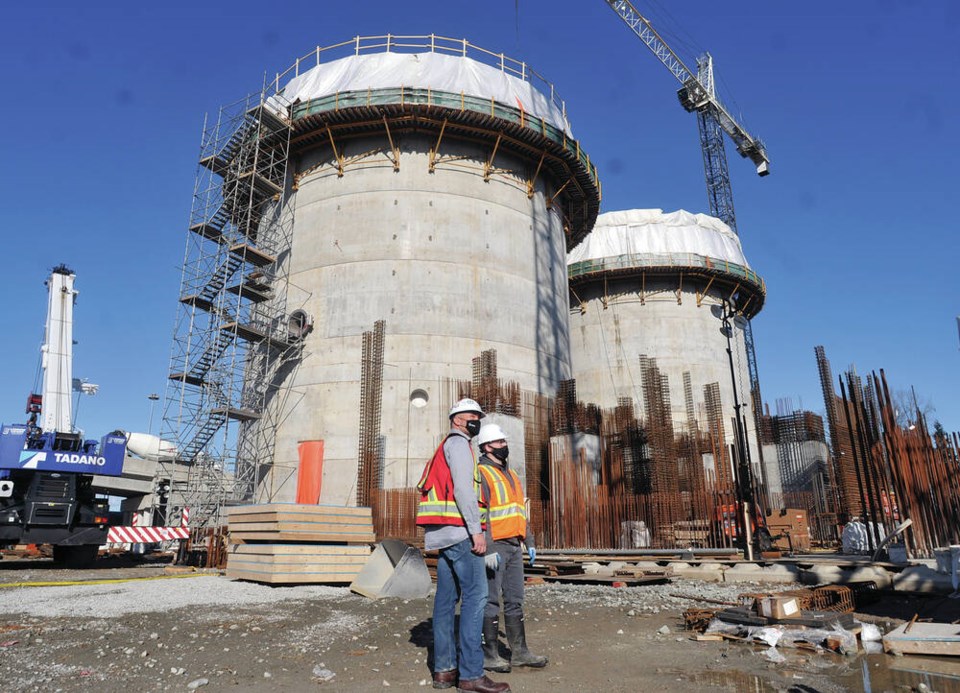If you ever wanted to lay awake at night fretting about runaway spending on a public project, you couldn't find a better fixation than the North Shore Wastewater Treatment Plant.
The latest report card reads: Profoundly behind schedule, prodigiously over budget, enmeshed in massive litigation, attempting to construct on the one hand and repairing what’s been inadequately constructed on the other.
West Vancouver has a lot at stake in this project, of course, and in broad outline, the plant stands to be a technical and environmental marvel serving 250,000 people on the North Shore – just, you know, years late, and hundreds of millions of dollars more pricy.
To read the Metro Vancouver reports of the last year is to weep at the early-stage folly. Lately, the language in the reports is more frank about tasks at hand. This is good for transparency, just not good for sleep habits.
The most recent insomnia-inducing information came to light last week when Metro’s liquid waste committee was asked to authorize another $85 million, more than double the original pre-construction services contract. Turns out there are newfound “significant deficiencies” in the original design and construction, including “in some cases, more extensive deficiencies than originally anticipated.”
Less than a year ago, $40 million appeared to be enough for the new firms, construction manager PCL Constructors Westcoast Inc. and design consultant AECOM.
The committee report says the inherited mess has hampered “advancing new construction” in favour of “identifying and repairing concrete deficiencies” by the original firm. Acciona Wastewater Solutions LP (Acciona/Project Co.) was fired in 2021, fired back in 2022 with a $250 million lawsuit against Metro Vancouver, which then fired back with a $500 million countersuit.
The plant is part of a larger program that includes decommissioning the Lions Gate Wastewater Plant in West Van to return to Sḵwx̱wú7mesh Úxwumixw (Squamish Nation), and two now-completed pieces – a two-kilometre conveyance pipe and a pumping station. The last approved budget some time ago for these was $1.05 billion, but that is to laugh out loud. Most likely, the laughing will subdue when the bill arrives.
We are in what Cheryl Nelms, the assigned Metro general manager of project delivery, euphemistically calls in her report a period of “rectification of excessive deficiencies.” Until we shed that, we will not have a clue about the real budget. We don’t even really have a plan for a plan right now, although a new estimate is due mid-year.
Good luck with your sleep this evening.
We have a member on Metro’s liquid waste committee, Coun. Christine Cassidy, and there are a whopping five mayors on it. These projects are financially daunting for municipal governments, and it would have paid for our mayor to join it. Instead, he’s the vice-chair of the water committee and on the financial plan task force.
Current politicians may not have been responsible for the plant’s shaky start, but they must now own the race all the way to the finish line. To do so requires update after update, answer after answer, to question after question. Credit Metro Vancouver with increasing bluntness.
It would make sense, once the lawsuits are settled, to understand what went wrong and why. We don’t need a royal commission, just a real commitment to comprehending mistakes and lessons along the way – publicly, too, because it’s a big-ticket project. British Columbia is at the best of times not the easiest jurisdiction in which to bid for this business. Few infrastructure firms consider us friendly, and it would financially pay to figure it out.
A side issue is the Metro Vancouver entity itself. Granted, the idea of amalgamating three North Shore communities, much less two dozen in Metro, is a political third rail. But electing people directly to Metro would provide more public accountability. It would improve continuity in governance, better than this revolving door each election of bonused civic officials with full-time municipal roles for which they campaigned. The extra gig is financially sweet – $105,000 for chair George Harvie of Delta, $525 to attend committee meetings, double when they run four hours. But when done elsewhere, regional governance attracts broader, bigger-picture thinking that – who knows? – might have saved us sleep.
Kirk LaPointe is publisher and executive editor of BIV as well as vice-president, editorial, Glacier Media Group, the North Shore News’ parent company. He is also a West Vancouverite.
What are your thoughts? Send us a letter via email by clicking here or post a comment below.


